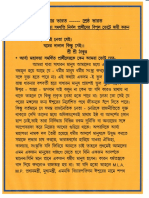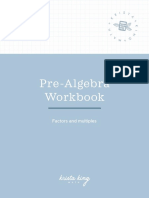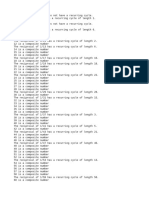0% found this document useful (0 votes)
56 views5 pagesMaths
This document contains math word problems and their solutions related to prime numbers, factors, and divisibility. It examines whether statements are true or false about sums and products being even or odd. It also finds pairs of prime numbers with the same digits, expresses numbers as the sum of two odd primes, and determines which numbers are prime. Other problems involve finding the common factor of two numbers, what other numbers a number is divisible by if divisible by a certain number, and writing true or false statements about divisibility.
Uploaded by
Ayush MukherjeeCopyright
© © All Rights Reserved
We take content rights seriously. If you suspect this is your content, claim it here.
Available Formats
Download as DOCX, PDF, TXT or read online on Scribd
0% found this document useful (0 votes)
56 views5 pagesMaths
This document contains math word problems and their solutions related to prime numbers, factors, and divisibility. It examines whether statements are true or false about sums and products being even or odd. It also finds pairs of prime numbers with the same digits, expresses numbers as the sum of two odd primes, and determines which numbers are prime. Other problems involve finding the common factor of two numbers, what other numbers a number is divisible by if divisible by a certain number, and writing true or false statements about divisibility.
Uploaded by
Ayush MukherjeeCopyright
© © All Rights Reserved
We take content rights seriously. If you suspect this is your content, claim it here.
Available Formats
Download as DOCX, PDF, TXT or read online on Scribd
/ 5

































